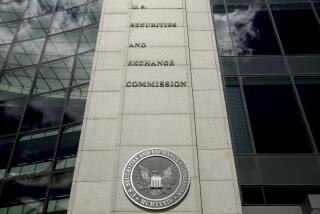Dealers Offer Evidence in Nasdaq Suit : Securities: Price-fixing case to move forward as brokerages turn over taped conversations.
- Share via
NEW YORK — A massive private class-action lawsuit against 33 Nasdaq dealer firms received a boost Friday as the firms agreed to turn over thousands of hours of taped conversations by traders, and to allow the suit to go forward.
The antitrust suit by investors and the state of Louisiana accuses the dealers of colluding to fix the prices of Nasdaq stocks and seeks hundreds of millions of dollars in damages, although an exact amount isn’t specified.
U.S. District Judge Robert Sweet in July had dismissed the original suit, saying that allegations weren’t specific enough. But lawyers promptly refiled the suit, making it more specific by naming the 1,659 stocks they contend were affected by price-fixing.
Catherine A. Ludden, one of the lawyers representing the dealers, confirmed Friday that they decided not to ask the judge to dismiss the new complaint, and instead would let the case go forward. She said that rather than seeking a new motion to dismiss, the dealers would allow the discovery phase of the case to begin--in which each side turns over evidence--and fight the charges on their merits. The dealers strongly deny any collusion.
Under the agreement, the investors’ lawyers for the first time will get access to much of the material the dealers already have given to the federal government. The Justice Department’s antitrust division and the Securities and Exchange Commission are conducting investigations of Nasdaq and the dealers.
The material includes thousands of hours of taped telephone conversations of traders, and some government sources who have heard the tapes contend they contain numerous examples of dealers improperly agreeing to fix prices and harassing other dealers who wouldn’t go along.
Lawyers for the brokerage firms deny that the tapes contain any evidence of a conspiracy.
The suit charges that dealers colluded to keep spreads wide. Spreads, essentially dealers’ profit margins, are the gaps between the price at which a dealer offers to buy a stock, and the higher price at which it offers to sell.
Robert A. Skirnick, one of the lead lawyers for the investors, said the agreement between the two sides was contained in an order submitted Friday. Judge Sweet was expected to sign the order, possibly with minor modifications. Skirnick said the agreement also will allow the investors’ lawyers to begin taking depositions from traders and Nasdaq officials.
More to Read
Inside the business of entertainment
The Wide Shot brings you news, analysis and insights on everything from streaming wars to production — and what it all means for the future.
You may occasionally receive promotional content from the Los Angeles Times.










